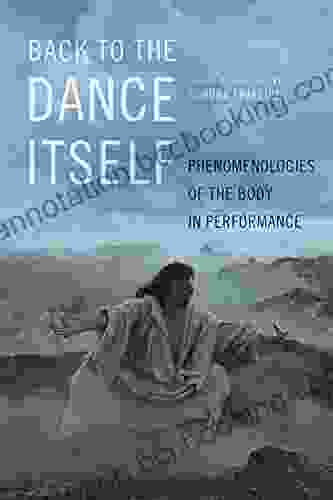: The Interplay of Body and Performance
Performance, in its myriad forms, has captivated human imagination and expression across cultures and epochs. At its heart lies an intricate interweaving of the body and the act of performance itself. This book, "Phenomenologies of the Body in Performance," delves into the depths of this profound relationship, exploring the phenomenological essence of embodiment, its cultural contexts, and its transformative power.
Chapter 1: Embodying the Phenomenological Perspective
Drawing upon the works of phenomenological philosophers such as Maurice Merleau-Ponty and Edmund Husserl, this chapter establishes the theoretical foundation for understanding the body as a lived, embodied experience. It examines the concept of "embodiment," where the body is not merely a physical entity but an integral part of our consciousness and subjectivity. Through vivid examples from performance art, dance, and theater, the chapter illustrates how the body becomes a site of meaning-making and expression.
5 out of 5
| Language | : | English |
| File size | : | 6186 KB |
| Text-to-Speech | : | Enabled |
| Screen Reader | : | Supported |
| Enhanced typesetting | : | Enabled |
| Word Wise | : | Enabled |
| Print length | : | 314 pages |
Chapter 2: Cultural Embodiments of the Performing Body
Performance is not confined to the realm of the individual but is deeply embedded within cultural contexts that shape and influence how the body is experienced and represented. This chapter explores the diverse cultural expressions of embodiment, from the ritualistic movements of traditional dances to the stylized gestures of theatrical conventions. It examines how cultural norms, beliefs, and power structures inform the ways in which bodies are perceived, valued, and utilized in performance.
Chapter 3: The Transformative Power of Embodied Performance
Performance has the capacity to transcend mere representation, becoming a transformative experience for both the performers and the audience. This chapter delves into the therapeutic, healing, and emancipatory potential of embodied performance. It examines how performance can provide a space for marginalized voices, challenge social norms, and foster a sense of liberation through the embodied expression of emotions, memories, and experiences.
Chapter 4: Methodologies for Researching Embodied Performance
Investigating the phenomenologies of the body in performance requires a diverse range of methodological approaches. This chapter provides a comprehensive overview of qualitative, ethnographic, and arts-based research methods tailored to capturing the complexities of embodied performance. It discusses the challenges and ethical considerations involved in researching such subjective and experiential phenomena.
Chapter 5: Embodied Cognitions in Performance Practice
Performance is not limited to the physical realm but also engages cognitive and mental processes. This chapter explores the concept of embodied cognition, which suggests that our understanding and knowledge of the world is fundamentally shaped by our bodily experiences. It investigates how embodied cognition manifests in performance practices, influencing aspects such as improvisation, choreography, and character development.
: Embodied Performance as a Catalyst for Understanding and Transformation
Through its nuanced exploration of the body in performance, this book offers a profound understanding of the interconnectedness of embodied experience, cultural contexts, and transformative potential. By delving into the phenomenologies of the body, we gain a deeper appreciation for the multifaceted nature of performance and its ability to illuminate the human condition in all its complexity.
Why You Need This Book:
- Gain a comprehensive understanding of the phenomenological essence of embodiment in performance.
- Explore the diverse cultural contexts that shape and influence the ways in which bodies are perceived and utilized in performance.
- Discover the transformative power of embodied performance, its therapeutic, healing, and emancipatory potential.
- Learn about innovative research methodologies designed specifically for investigating embodied performance.
- Unlock the insights of embodied cognition and its implications for performance practices.
- Enhance your appreciation for the depth and complexity of performance as an art form and a catalyst for understanding and transformation.

























































































